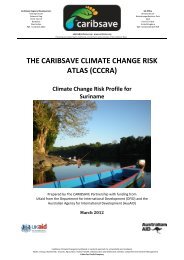Create successful ePaper yourself
Turn your PDF publications into a flip-book with our unique Google optimized e-Paper software.
Intergovernmental Panel on Climate Change (IPCC) suggests a decline in emissions by 20% by 2020 (IPCC,<br />
2007), corresponding to about 3 t CO2 per capita per year, a figure that also considers global population<br />
growth. While there is consequently room for many countries in the region to increase per capita<br />
emissions, including in particular Haiti, many of the more developed countries in the Caribbean, including<br />
<strong>Turks</strong> <strong>and</strong> <strong>Caicos</strong>, will need to adjust per capita emissions budgets downwards, i.e. reduce national<br />
emissions in the medium-term future.<br />
Figure 4.2.2: Per capita emissions of CO2 in selected countries in the Caribbean, 2005<br />
(Source: Hall et al., 2009)<br />
Important in the context of this report is that in most Caribbean countries, tourism is a major contributor to<br />
emissions of greenhouse gases (Simpson et al., 2008; see also country reports in the Risk Atlas). As these<br />
emissions are not usually quantified, the purpose of this assessment is to look in greater detail into energy<br />
use by the sector.<br />
The <strong>Turks</strong> <strong>and</strong> <strong>Caicos</strong> Isl<strong>and</strong>s<br />
Electricity is supplied to the isl<strong>and</strong>s by two providers under 50-year licenses from the Government. The<br />
isl<strong>and</strong>s of Providenciales, North, Middle <strong>and</strong> South <strong>Caicos</strong> are supplied by Fortis <strong>Turks</strong> <strong>and</strong> <strong>Caicos</strong> who<br />
operate Provo Power Company Ltd. (PPC) <strong>and</strong> Atlantic Equipment <strong>and</strong> Power (<strong>Turks</strong> <strong>and</strong> <strong>Caicos</strong>) Ltd. The<br />
latter serves South <strong>Caicos</strong> only. <strong>Turks</strong> & <strong>Caicos</strong> Utilities, Ltd. (TCU) supplies Gr<strong>and</strong> Turk <strong>and</strong> Salt Cay (WRB,<br />
n.d.).<br />
PPC serves more than 9,000 customers corresponding to 85% of consumers in TCI <strong>and</strong> has an exclusive<br />
public supplier‘s license to provide service to the whole of Providenciales. This means that should any other<br />
entity apply to generate <strong>and</strong> distribute power on the isl<strong>and</strong>, PPC have the right to be notified <strong>and</strong> heard<br />
before a decision is made. In 2009, the utility had a total diesel-powered electricity generation capacity of<br />
54MW; peak dem<strong>and</strong> in that year reached 29.6 MW. Recent acquisition <strong>and</strong> installation of 2 more efficient<br />
units should have raised capacity to 60 MW (46.3MW of medium speed diesel, <strong>and</strong> 17.7MW of high speed<br />
diesel plant) (Castalia, 2011). The first of the two engines was commissioned in October 2010 <strong>and</strong> the<br />
second was installed in August, 2011 (Fortis TCI, 2011). Table 4.2.1 shows the breakdown of dem<strong>and</strong> by<br />
41





